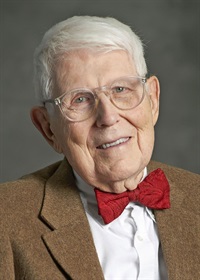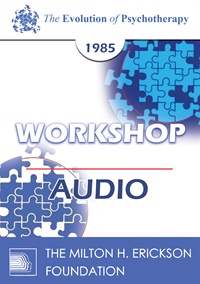EP85 Workshop 24 - Cognitive Therapy of Depression - Aaron T. Beck, MD
- Average Rating:
- Not yet rated
- Topic Areas:
- Workshops | Cognitive Behavior Therapy (CBT) | Depression | Psychotherapy
- Categories:
- Evolution of Psychotherapy | Evolution of Psychotherapy 1985
- Faculty:
- Aaron Beck, MD | Stowe Hausner, PhD
- Duration:
- 2 Hours 45 Minutes
- Format:
- Audio Only
- Original Program Date:
- Dec 14, 1985
- License:
- Never Expires.
Description
Description:
An information processing model designed to clarify the biased and constricted thinking in depression will be described. The practical applications of the model use principles of guided discovery and collaborative empiricism. There will be a demonstration of specific strategies applied to dysfunctional cognitions and beliefs. A blending of cognitive and behavioral techniques are used for in vivo exercises.
Educational Objectives:
- To assess the cognitive structure of a given case of depression
- To specify and describe four specific cognitive techniques and three behavioral techniques
*Sessions may be edited for content and to preserve confidentiality*
Credits
Faculty

Aaron Beck, MD Related Seminars and Products
Dr. Aaron T. Beck, M.D. is University Professor of Psychiatry (Emeritus) in the Department of Psychiatry, Perelman School of Medicine at the University of Pennsylvania and director of the Aaron T. Beck Psychopathology Research Center. Based on his research on the psychological processes involved in depression and other disorders, he developed and tested Cognitive Therapy (also known as Cognitive Behavior Therapy), the most widely used form of psychotherapy in the world. He has personally trained large numbers of professionals in this specialized approach and helped to form centers for Cognitive Therapy throughout the world, devoted to both research and serving countless numbers of patients. Starting in 2007, he has directed the Beck Initiative partnership in collaboration with Arthur Evans, former Commissioner of Mental Health of Philadelphia, serving the Medicaid patients in the city. He and his group have been training providers, offering services to the most disadvantaged individuals in the city and state: severely mentally ill individuals confined to hospitals and jails, and also the homeless.
For several decades, Beck conducted research on the psychological and social factors involved in schizophrenia and developed a humanistic approach involved in activating the individual’s latent goals, motivations, and capacities, and has helped to restore large numbers to meaningful lives. His innovative approach in Philadelphia and Pennsylvania has now been extended to other states such as Georgia, Massachusetts, New Jersey, and Utah. In collaboration with the National Association of State Commissioners of Mental Health, he and his Center have started to disseminate his approach throughout the country. In addition, he and his team are working with Gary Gottlieb, Chief Executive Officer of Partners in Health to adapt cognitive therapy to the needs of individuals in 27 developing countries.
Beck has described his work extensively in 637 publications, including 24 books. He has been named by Medscape as one of the 50 Most Influential Physicians in History: 20th on the list and 1st among the living. He has received the 2006 Albert Lasker Award for Clinical Medical Research, which “transformed the understanding and treatment” of mentally ill individuals, the 2006 National Academy of Medicine: Lienhard Award for the advancement of health services, the 2013 Kennedy Community Health Award, and the National Alliance on Mental Illness Lifetime Achievement Award (June, 2017).
Stowe Hausner, PhD Related Seminars and Products
Mrs. Hausner, a 1944 graduate of Hunter College, was a founding director of the social services division at Northern Westchester Hospital in Mount Kisco, and chief social worker for the Westchester County Community Health Board.
In the late 1960's she became a program manager in the alcohol, mental health, and drug division of the National Institute of Mental Health, supervising the Federal agency's programs in the New York metropolitan area, Puerto Rico, and the Virgin Islands. Later, she taught social work at the State University of New York at Stony Brook and maintained an active practice in cognitive therapy.


